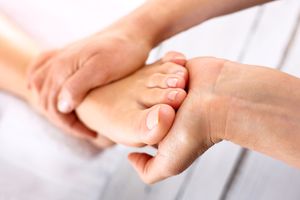5 FAQ About Heel Pain From Plantar Fasciitis

Plantar fasciitis typically causes heel pain near where it meets the arch. The condition can be acute, with discomfort occurring only under certain triggers, or chronic, which may worsen over time. Here are five commonly asked questions about this condition.
Top FAQ on Plantar Fasciitis & Heel Pain
What causes plantar fasciitis?
Foot shape, lifestyle, age, and body type are all factors that can cause plantar fasciitis. People with uniquely high or low arches are more prone to it, as are people who spend a lot of time on their feet, people who are overweight, and people who are middle-aged or older. The condition occurs when the tissues of the plantar fascia tendon that connects to the heel bone become stressed and inflamed. If the Achilles tendon and calf muscle are tight, this can exacerbate the condition.
What does plantar fasciitis feel like?
Plantar fasciitis pain is typically at its worst first thing in the morning because the plantar fascia tendon has been dormant all night. As you move throughout the day, it loosens and the pain subsides. If you spend a lot of time on your feet, the pain may return as the tendon becomes stressed again.
How can I prevent it?
 Shoes with strong arch support or custom inserts prevent pain. People who are overweight may experience relief after weight loss. If you have acute heel pain that occurs only with certain activities, taking a rest may help you avoid pain later. Stretching to loosen tight leg muscles and tendons can also limit long-term pain.
Shoes with strong arch support or custom inserts prevent pain. People who are overweight may experience relief after weight loss. If you have acute heel pain that occurs only with certain activities, taking a rest may help you avoid pain later. Stretching to loosen tight leg muscles and tendons can also limit long-term pain.
How can I get pain relief?
For short-term pain alleviation, an over-the-counter anti-inflammatory like ibuprofen helps. An ice pack or frozen water bottle on your feet before you go to bed can ease inflammation before it starts. Your doctor may also suggest a corticosteroid shot for chronic types. Although this treatment relieves heel pain, it doesn’t provide long-term healing.
When should I see a doctor?
If plantar fasciitis continues for more than a week after you’ve rested and iced the area, talk to your doctor. The heel pain can worsen and become more difficult to treat. You should also see a doctor if you’re unable to participate in exercise or your daily activities.
Orthopaedic Associates of Rochester in Rochester, NY, offers relief and healing for sports injuries, joint, foot, and heel pain. With on-site X-ray suites and same-day care, this team of orthopaedists will get you a diagnosis and treatment plan quickly to help you heal. This independent office takes most insurance plans and has local hospital privileges. Call (585) 723-3000 or request your appointment online now.
About the Business
Have a question? Ask the experts!
Send your question

